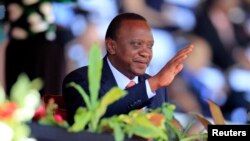Manoah Esipisu, Kenya’s government spokesman, says President Uhuru Kenyatta is committed to press freedom as outlined in the constitution.
Comment comes as journalists protest some clauses in a controversial media measure that parliament passed in late October.
Esipisu says Kenyatta is following the constitution, which calls for an independent media regulator that is not subject to government, political or commercial influence.
“The president believes that we have to conform to the constitution, [which] says media can’t regulate itself. And that the journalist must understand that you bear responsibility for what you do,” he said. “Having fines in the legislation just reminds all of us, who are objective journalists, that there are penalties for people who are a bit careless or who go out of their way to [break] the law.”
Esipisu says Kenyatta has called for the nomination of individuals to establish the independent group to oversee the media.
Kenyatta vetoed the initial legislation last week, but he retained some of its clauses and returned the bill to parliament for review. On Tuesday journalists protested and said if passed the new law could be used to muzzle the press, undermining constitutional guarantees of media freedom.
Esipisu disagreed.
“The idea that anyone wants to muzzle the press is indeed far-fetched,” he said. “This constitution has a timeline for legislation and this piece of legislation … has to come on stream by the end of this month. But the provisions that are in there all conform to the constitution promulgated in 2010.”
If established, the media-regulating body would review complaints in addition to penalizing the media for offenses.
Kenyatta has proposed fines of about 500,000 shillings [or $5,000] per journalist or a maximum of 20 million shillings [or $240,000] for any media group that violates the code of journalistic conduct, according to Esipisu.
David Ohito, a leading member of Kenya’s Editor’s Guild, expressed disappointment with Kenyatta’s proposal to “The Standard” newspaper.
“We are not happy and satisfied with the way the bill is. It is us who will suffer if it is passed as it is…We will profile those who will stand by us and those who will be against us,” he said. “They should not take us back to the past dark days of repression against free media.”
Some observers have called for an independent group, comprised of media professionals, to regulate the press instead of the plan lawmakers and Kenyatta propose.
But, Esipisu says the suggestion contradicts clauses of the constitution.
“The idea that journalists should regulate themselves would be a noble one, [and] that is how it has previously happened, but the constitution doesn’t allow us,” he said. “Journalists, somehow three years after the promulgation of the constitution, have suddenly found out that [it] does not allow self- regulation…The president or parliament [do not want] to muzzle the media.”
Comment comes as journalists protest some clauses in a controversial media measure that parliament passed in late October.
Esipisu says Kenyatta is following the constitution, which calls for an independent media regulator that is not subject to government, political or commercial influence.
“The president believes that we have to conform to the constitution, [which] says media can’t regulate itself. And that the journalist must understand that you bear responsibility for what you do,” he said. “Having fines in the legislation just reminds all of us, who are objective journalists, that there are penalties for people who are a bit careless or who go out of their way to [break] the law.”
Esipisu says Kenyatta has called for the nomination of individuals to establish the independent group to oversee the media.
Kenyatta vetoed the initial legislation last week, but he retained some of its clauses and returned the bill to parliament for review. On Tuesday journalists protested and said if passed the new law could be used to muzzle the press, undermining constitutional guarantees of media freedom.
Esipisu disagreed.
“The idea that anyone wants to muzzle the press is indeed far-fetched,” he said. “This constitution has a timeline for legislation and this piece of legislation … has to come on stream by the end of this month. But the provisions that are in there all conform to the constitution promulgated in 2010.”
If established, the media-regulating body would review complaints in addition to penalizing the media for offenses.
Kenyatta has proposed fines of about 500,000 shillings [or $5,000] per journalist or a maximum of 20 million shillings [or $240,000] for any media group that violates the code of journalistic conduct, according to Esipisu.
David Ohito, a leading member of Kenya’s Editor’s Guild, expressed disappointment with Kenyatta’s proposal to “The Standard” newspaper.
“We are not happy and satisfied with the way the bill is. It is us who will suffer if it is passed as it is…We will profile those who will stand by us and those who will be against us,” he said. “They should not take us back to the past dark days of repression against free media.”
Some observers have called for an independent group, comprised of media professionals, to regulate the press instead of the plan lawmakers and Kenyatta propose.
But, Esipisu says the suggestion contradicts clauses of the constitution.
“The idea that journalists should regulate themselves would be a noble one, [and] that is how it has previously happened, but the constitution doesn’t allow us,” he said. “Journalists, somehow three years after the promulgation of the constitution, have suddenly found out that [it] does not allow self- regulation…The president or parliament [do not want] to muzzle the media.”










